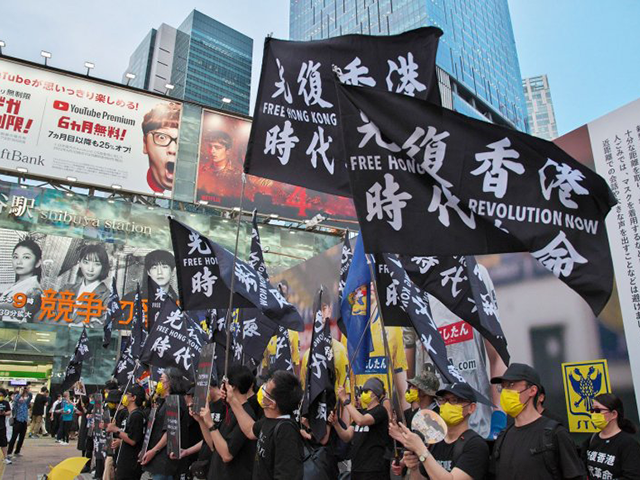The South Korean Rugby Union on Monday apologized for playing the protest song “Glory to Hong Kong” instead of the Chinese Communist anthem at the men’s finals match in Incheon on Sunday.
The Beijing-controlled government of Hong Kong quickly issued a statement denouncing the tournament organizers for “failing to ensure that the national anthem receives the respect it was warranted.”
Tournament officials broadcast an apology to the audience at the Incheon stadium after the protest song was played, and made a point of playing the Communist anthem “March of the Volunteers” when the Hong Kong team won the match and received an award.
“Asia Rugby and Korea Rugby Union would like to sincerely apologize to the Hong Kong Rugby Union, the Government of Hong Kong Special Administrative Region and the Government of the People’s Republic of China for this incident,” the organizers said in their formal statement of apology.
“The incident happened due to a simple human error from a junior member of the local organizing committee, playing a song downloaded from the internet instead of the correct anthem,” the union said.
A source within the Korea Rugby Union told the South China Morning Post (SCMP) on Monday that a staffer “inadvertently” selected “Glory to Hong Kong” because they believed it was the correct national anthem.
“Those involved have absolutely no political motives. They are innocent employees who felt very much embarrassed by the mistakes they committed,” the source said.
Those apologies were not enough to placate the Hong Kong government, which officially accepted the “human error” explanation but still demanded a “full and in-depth investigation” by the Hong Kong Rugby Union.
The SCMP quoted Beijing-controlled Hong Kong politicians urging prosecution for whoever played the protest anthem:
Senior Counsel Ronny Tong Ka-wah, a member of Hong Kong’s key decision-making Executive Council, said: “This was surely not a careless mistake. It must be a criminal act with mens rea [criminal intent], and the people involved could have committed sedition under the Crimes Ordinance, as well as secession or collision with foreign forces under the national security law.”
Lawmaker Junius Ho Kwan-yiu, an establishment hardliner, suggested disbanding the Hong Kong rugby team and accused the players of “not responding at all” when the song was played.
“They let the country face humiliation. They have completely failed and lost our confidence and the only solution to this is to disband the team,” he said.
“Glory to Hong Kong” was composed by an anonymous Hong Kong musician and embraced by the 2019 protest movement as its unofficial anthem. Protesters sang it together during demonstrations and created numerous YouTube videos of the song performed in different styles, including one immensely popular video that featured an orchestra wearing helmets and gas masks, which had become common attire during street demonstrations after the Hong Kong police launched a brutal crackdown.
The anthem was effectively erased by the draconian “national security law” Beijing forced on Hong Kong in the summer of 2020, effectively classifying all criticism of the Communist-controlled island government as illegal and seditious. The song was banned from schools under the national security law, in part because it includes lyrics such as “Liberate our Hong Kong in common breath” and “Revolution of our times,” the slogan of the 2019 movement.
Hong Kong also criminalized “disrespect” for the Chinese Communist flag and anthem in 2020, shutting down protest gestures such as turning one’s back or making rude gestures during the anthem, or even waving other flags.
On the other hand, the regime in Beijing has actually censored “March of the Volunteers” when it was allegedly used for improper purposes, arguably showing the same disrespect for its own anthem that is criminalized in Hong Kong.
For example, Shanghai residents were blocked from quoting or playing the Chinese anthem last spring and summer, when they sardonically quoted lyrics such as “rise up, people who don’t want to be slaves!” to protest the brutal coronavirus lockdown imposed on their city. Earlier in the pandemic, the Communist government decided the first line of its own anthem was tainted with “radical” politics because the lyric was often quoted in tribute to Dr. Li Wenliang, the doctor who was ruthlessly silenced by the Communist Party for sounding an early warning about the mysterious coronavirus in Wuhan.

COMMENTS
Please let us know if you're having issues with commenting.